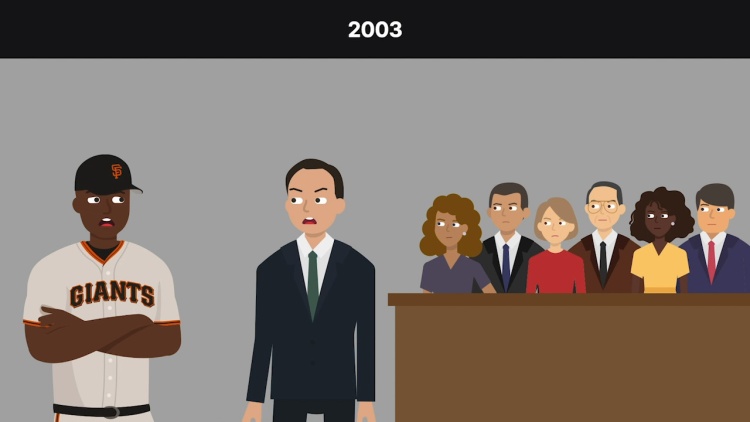United States v. Bonds
United States Court of Appeals for the Ninth Circuit
784 F.3d 582 (2015)

- Written by Rich Walter, JD
Facts
The federal government (plaintiff) prosecuted Barry Bonds (defendant), a celebrated baseball player who was the son of another famous player, for obstruction of justice in violation of 18 U.S.C. § 1503. The charge arose from testimony that Bonds gave before a federal grand jury investigating his and other professional athletes' rumored use of steroids and other banned performance-enhancing drugs (PEDs). The prosecutor asked Bonds to tell the grand jury if his trainer, Greg Anderson, had ever given Bonds a self-injectable substance. Bonds' rambling reply, to the effect that he might chat with Anderson about fishing, but never about baseball or each others' personal business, included what became known as "Statement C": "That's what keeps our friendship. You know, I am sorry, but that—you know, that—I was a celebrity child, not just in baseball by my own instincts. I became a celebrity child with a famous father. I just don't get into other people's business because of my father's situation, you see." Statement C was factually truthful about Bonds' celebrity lineage, and the grand jury later learned the truth about Anderson's distribution of self-injectable PEDs from Bonds himself as well as from other witnesses. Nevertheless, the jury found that Statement C was misleading and evasive, and that Bonds was guilty of obstructing justice. The court sentenced Bonds to 30 days' home confinement and two years' probation. Bonds appealed. After a panel of the Ninth Circuit Court of Appeals affirmed his conviction in a 2013 decision reported at 730 F.3d 890, Bonds took his appeal to the full court.
Rule of Law
Issue
Holding and Reasoning (Per curiam)
What to do next…
Here's why 907,000 law students have relied on our case briefs:
- Written by law professors and practitioners, not other law students. 47,100 briefs, keyed to 996 casebooks. Top-notch customer support.
- The right amount of information, includes the facts, issues, rule of law, holding and reasoning, and any concurrences and dissents.
- Access in your classes, works on your mobile and tablet. Massive library of related video lessons and high quality multiple-choice questions.
- Easy to use, uniform format for every case brief. Written in plain English, not in legalese. Our briefs summarize and simplify; they don’t just repeat the court’s language.





